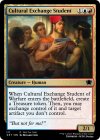So if discussing cards from other perspectives isn't productive, what exactly is the point of talking about individual cards? Is it just a space for people to say "I think this is cool" and no other conversation beyond that matters? Just trying to get a feel for the kinds of discussions you cats are interested in having here
Well, it
is productive to talk about cards in terms of power level, it's just not everyone's individual design goals care about power level alone. Lots of people here are ok with playing mediocre cards as long as they can do something some amount of the time. To them, it's less about "how much does this card let me win on average" and more about "can this card ever do it's thing in my broader environment."
This doesn't mean that people
don't care about power level, they just care less about picking the most powerful card available in their given power band and more about picking the coolest card available in their power band. Like yeah,
Painful Truths is almost always going to provide more immediate value than
Cunning Rhetoric, but that's not the only important factor if one of your goals is to do cute stuff with
Zur the Enchanter. In that case, you're just trying to figure out if
Cunning Rhetoric can do it's thing often enough to justify it's slot.
Basically, people tend to evaluate more from the perspective of...
How does this card contribute to the gameplan of my deck compared to other options I could be running?
And less from...
Is it an increase or decrease in my expected winpercentage?
...because a lot of people here don't care too much about win percentage provided the different support archetypes are roughly even in terms of power level.
Now having said that, if someone just randomly asks about a card out of context, there's not an issue with saying that it's probably not good. I think it's important to try to help ground people in when a card is going to be worth playing on average. If you think about the discussion we had about
Goblin Engineer yesterday, I think you can maybe get an idea of what I'm talking about.
Goblin Engineer is really, really strong when you have proper support for it, but it doesn't do anything without that support base.
Goblin Engineer has a terrible base rate without support, but in the right environment, it can be one of the best cards. Obviously the ceiling on
Goblin Engineer is much higher than that of some of the other cards that tend to get thrown around here, but the example still stands.
What I like to do when I'm trying to argue against a card is state the applications where it could be useful, but showcase why that ceiling isn't necessarily realistic or would require a lot of dedicated support to pull off. Basically, I like to acknowledge that the card could do something, but then state why it generally won't


